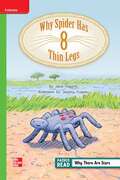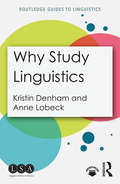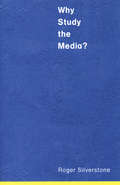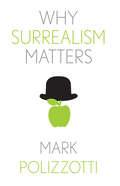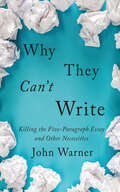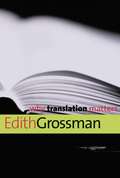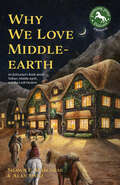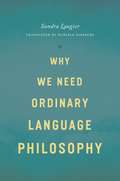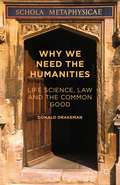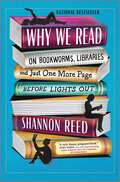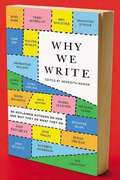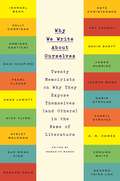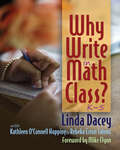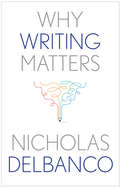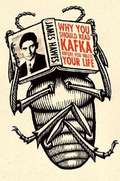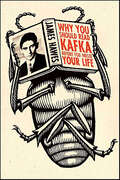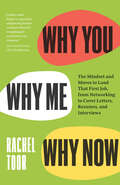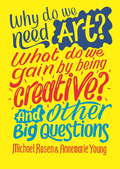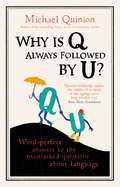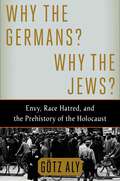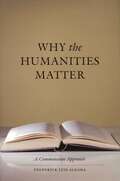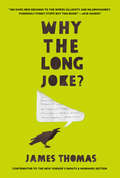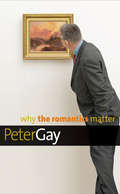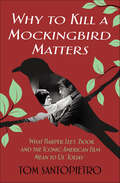- Table View
- List View
Why Study Linguistics (Routledge Guides to Linguistics)
by Kristin Denham Anne LobeckWhy Study Linguistics is designed to help anyone with an interest in studying language understand what linguistics is, and what linguists do. Exploring how the scientific study of language differs from other ways of investigating this uniquely human behavior, Why Study Linguistics: explores the various topics that students of linguistics study, including sound systems of language, the structure of words and sentences and their meanings, and the wider social context of language change and language variation; explains what you might do with a degree in linguistics and the kinds of jobs and careers that studying linguistics prepares you for; is supported by a list of links to additional resources available online. This book is the first of its kind and will be essential reading for anyone considering a course of study in this fascinating subject, as well as teachers, advisors, student mentors, and anyone who wants to know more about the scientific study of language.
Why Study the Media?
by Professor Roger Silverstone"It's easy to be snobbish about media culture; the great merit of Roger Silverstone's book is to make the reader understand just how important that culture is." - Richard Sennett, New York University "A remarkable book which argues for a new paradigm for the study of the media." - Daniel Dayan, Centre National de la Recherche "A persuasive and sophisticated discussion of the role of the media in modern life at the threshold of the twenty-first century." - Ellen Seiter, University of California "A very important book, one that moves media theory and argument on at long last. This is an attempt to get people to think differently about the media - not just when they are writing essays, but also when they are arguing about media in everyday life." - Simon Frith, University of Stirling The centrality of the media, all media, to human experience - from the conduct of everyday life, to the exercise of power, to the creation of culture - is inescapable. We live in an intensely mediated world. Yet the academic study of the media has rarely made its own insights accessible and relevant to those outside its own limited sphere. Indeed it is constantly under attack for its lack of rigour, apparent failure to address the needs of industry and its inability to tell us anything substantive about the world in which we live. Written as a manifesto and in order to set a new intellectual agenda, Why Study the Media? argues for the importance of the media in our culture and society and the consequent necessity of taking the media seriously as an object of enlightened but rigorous investigation. At once human and humane, Why Study the Media? will be welcomed by all those in search of new ways of thinking about our mediated world.
Why Surrealism Matters (Why X Matters Series)
by Mark PolizzottiAn elegant consideration of the Surrealist movement as a global phenomenon and why it continues to resonate Why does Surrealism continue to fascinate us a century after André Breton’s Manifesto of Surrealism? How do we encounter Surrealism today? Mark Polizzotti vibrantly reframes the Surrealist movement in contemporary terms and offers insight into why it continues to inspire makers and consumers of art, literature, and culture. Polizzotti shows how many forms of popular media can thank Surrealism for their existence, including Monty Python, Theatre of the Absurd, and trends in fashion, film, and literature. While discussing the movement’s iconic figures—including André Breton, Leonora Carrington, Salvador Dalí, René Magritte, Man Ray, and Dorothea Tanning—he also broadens the traditionally French and male-focused narrative, constructing a more diverse and global representation. And he addresses how the Surrealists grappled with ideas that mirror current concerns, including racial and economic injustice, sexual politics, issues of identity, labor unrest, and political activism. Why Surrealism Matters provides a concise, engaging exploration of how, a century later, the “Surrealist revolution” remains as dynamic as ever.
Why They Can't Write: Killing the Five-Paragraph Essay and Other Necessities
by John WarnerAn important challenge to what currently masquerades as conventional wisdom regarding the teaching of writing.There seems to be widespread agreement that—when it comes to the writing skills of college students—we are in the midst of a crisis. In Why They Can't Write, John Warner, who taught writing at the college level for two decades, argues that the problem isn't caused by a lack of rigor, or smartphones, or some generational character defect. Instead, he asserts, we're teaching writing wrong. Warner blames this on decades of educational reform rooted in standardization, assessments, and accountability. We have done no more, Warner argues, than conditioned students to perform "writing-related simulations," which pass temporary muster but do little to help students develop their writing abilities. This style of teaching has made students passive and disengaged. Worse yet, it hasn't prepared them for writing in the college classroom. Rather than making choices and thinking critically, as writers must, undergraduates simply follow the rules—such as the five-paragraph essay—designed to help them pass these high-stakes assessments.In Why They Can't Write, Warner has crafted both a diagnosis for what ails us and a blueprint for fixing a broken system. Combining current knowledge of what works in teaching and learning with the most enduring philosophies of classical education, this book challenges readers to develop the skills, attitudes, knowledge, and habits of mind of strong writers.
Why Translation Matters
by Edith GrossmanWhy Translation Matters argues for the cultural importance of translation and for a more encompassing and nuanced appreciation of the translator's role. As the acclaimed translator Edith Grossman writes in her introduction, "My intention is to stimulate a new consideration of an area of literature that is too often ignored, misunderstood, or misrepresented." For Grossman, translation has a transcendent importance: "Translation not only plays its important traditional role as the means that allows us access to literature originally written in one of the countless languages we cannot read, but it also represents a concrete literary presence with the crucial capacity to ease and make more meaningful our relationships to those with whom we may not have had a connection before. Translation always helps us to know, to see from a different angle, to attribute new value to what once may have been unfamiliar. As nations and as individuals, we have a critical need for that kind of understanding and insight. The alternative is unthinkable." Throughout the four chapters of this bracing volume, Grossman's belief in the crucial significance of the translator's work, as well as her rare ability to explain the intellectual sphere that she inhabits as interpreter of the original text, inspires and provokes the reader to engage with translation in an entirely new way.
Why We Gesture
by David McneillGestures are fundamental to the way we communicate, yet our understanding of this communicative impulse is clouded by a number of ingrained assumptions. Are gestures merely ornamentation to speech? Are they simply an 'add-on' to spoken language? Why do we gesture? These and other questions are addressed in this fascinating book. McNeill explains that the common view of language and gesture as separate entities is misinformed: language is inseparable from gesture. There is gesture-speech unity. Containing over 100 illustrations, Why We Gesture provides visual evidence to support the book's central argument that gestures orchestrate speech. This compelling book will be welcomed by students and researchers working in linguistics, psychology and communication.
Why We Love Middle-earth: An Enthusiast's Book about Tolkien, Middle-earth, and the LotR Fandom
by Shawn E Marchese Alan SistoFor Fans of the Tales of Tolkien, Middle-earth, and More"...a great resource for readers and film-viewers who are new to Tolkien and curious about all things Middle-earth.” —Corey Olsen, The Tolkien Professor and president of Signum University#1 New Release in British & Irish Literary Criticism and EncyclopediasLearn about the man who wrote The Lord of the Rings in this Middle-earth treasury. Full of answers to common questions asked by readers to learn about Middle-earth and the fandom, this book about Tolkien celebrates Why We Love Middle-earth. The Lord of the Rings omnibus for all. Who wrote The Lord of the Rings? What details are in the movies, books, and other stories—and how do they tie together? Intrigued by Amazon’s new show The Lord of the Rings: The Rings of Power? What’s the story as Tolkien told it? Dive into Middle-earth’s expansive lore with Why We Love Middle-earth, a fandom book about Tolkien’s work.The perfect companion for any Middle-earth traveler. Written by beloved Tolkien commenters of The Prancing Pony Podcast, Shawn E. Marchese and Alan Sisto, Why We Love Middle-earth is the ultimate guide to the fandom. Newcomers and existing fans of Tolkien will revel in the dragon’s hoard of information inside.Inside, find:A brief history of Tolkien’s creation of Middle-earth, including facts you likely never knewA recommended reading order for Tolkien’s major works, and the reasoning behind itAn introduction to some of the real-world influences that inspired TolkienAn overview of some of the most popular branches of the fandom, including adaptations, collecting, languages, and moreOriginal illustrations of Middle-earth by illustrator Emily AustinIf you enjoy fandom books or a good book about Tolkien’s works such as Atlas Of Middle-Earth, Recipes from the World of Tolkien, or Why We Love Star Wars, you’ll love Why We Love Middle-earth.
Why We Need Ordinary Language Philosophy
by Sandra Laugier Translated by Daniela GinsburgSandra Laugier has long been a key liaison between American and European philosophical thought, responsible for bringing American philosophers such as Ralph Waldo Emerson, Henry David Thoreau, and Stanley Cavell to French readersOCobut until now her books have never been published in English. "Why We Need Ordinary Language Philosophy" rights that wrong with a topic perfect for English-language readers: the idea of analytic philosophy. aFocused on clarity and logical argument, analytic philosophy has dominated the discipline in the United States, Australia, and Britain over the past one hundred years, and it is often seen as a unified, coherent, and inevitable advancement. Laugier questions this assumption, rethinking the very grounds that drove analytic philosophy to develop and uncovering its inherent tensions and confusions. Drawing on J. L. Austin and the later works of Ludwig Wittgenstein, she argues for the solution provided by ordinary language philosophyOCoa philosophy that trusts and utilizes the everyday use of language and the clarity of meaning it providesOCoand in doing so offers a major contribution to the philosophy of language and twentieth- and twenty-first-century philosophy as a whole.
Why We Need the Humanities: Life Science, Law and the Common Good
by Donald DrakemanAn entrepreneur and educator highlights the surprising influence of humanities scholarship on biomedical research and civil liberties. This spirited defence urges society to support the humanities to obtain continued guidance for public policy decisions, and challenges scholars to consider how best to fulfil their role in serving the common good.
Why We Read: On Bookworms, Libraries, and Just One More Page Before Lights Out
by Shannon Reed*NATIONAL BESTSELLER**A Good Housekeeping Reads pick*A hilarious and incisive exploration of the joys of reading from a "beloved and wonderful writer" (George Saunders), teacher, bibliophile, and Thurber Prize SemifinalistWe read to escape, to learn, to find love, to feel seen. We read to encounter new worlds, to discover new recipes, to find connection across difference, or simply to pass a rainy afternoon. No matter the reason, books have the power to keep us safe, to challenge us, and perhaps most importantly, to make us more fully human.Shannon Reed, a longtime teacher, lifelong reader, and New Yorker contributor, gets it. With one simple goal in mind, she makes the case that we should read for pleasure above all else. In this whip-smart, laugh-out-loud-funny collection, Reed shares surprising stories from her life as a reader and the poignant ways in which books have impacted her students. From the varied novels she cherishes (Gone Girl, Their Eyes Were Watching God) to the ones she didn&’t (Tess of the d&’Urbervilles), Reed takes us on a rollicking tour through the comforting world of literature, celebrating the books we love, the readers who love them, and the ways in which literature can transform us for the better.
Why We Write
by Meredith MaranTwenty of America's bestselling authors share tricks, tips, and secrets of the successful writing life. Anyone who's ever sat down to write a novel or even a story knows how exhilarating and heartbreaking writing can be. So what makes writers stick with it? In Why We Write, twenty well-known authors candidly share what keeps them going and what they love most--and least--about their vocation. Contributing authors include: Isabel Allende David Baldacci Jennifer Egan James Frey Sue Grafton Sara Gruen Kathryn Harrison Gish Jen Sebastian Junger Mary Karr Michael Lewis Armistead Maupin Terry McMillan Rick Moody Walter Mosley Susan Orlean Ann Patchett Jodi Picoult Jane Smiley Meg Wolitzer
Why We Write About Ourselves
by Meredith MaranEverything an aspiring memoirist needs to know, in one readable volume, a follow-up to the acclaimed writers' handbook Why We Write For the many amateurs and professionals who write about themselves--bloggers, journal-keepers, aspiring essayists, and memoirists--this book offers inspiration, encouragement, and pithy, practical advice. Twenty of America's bestselling memoirists share their innermost thoughts and hard-earned tips with veteran author Meredith Maran, revealing what drives them to tell their personal stories, and the nuts and bolts of how they do it. Speaking frankly about issues ranging from turning oneself into an authentic, compelling character to exposing hard truths, these successful authors disclose what keeps them going, what gets in their way, and what they love most--and least--about writing about themselves.From the Trade Paperback edition.
Why Write in Math Class?
by Linda Dacey Rebeka Eston Salemi Kathleen O'Connell HoppingTo help students communicate their mathematical thinking, many teachers have created classrooms where math talk has become a successful and joyful instructional practice. Building on that success, the ideas in Why Write in Math Class? help students construct, explore, represent, refine, connect, and reflect on mathematical ideas. Writing also provides teachers with a window into each student's thinking and informs instructional decisions.Focusing on five types of writing in math (exploratory, explanatory, argumentative, creative, and reflective), Why Write in Math Class? offers a variety of ways to integrate writing into the math class. The ideas in this book will help you make connections to what you already know about the teaching of writing within literacy instruction and build on what you've learned about the development of classroom communities that support math talk.The authors offer practical advice about how to support writing in math, as well as many specific examples of writing prompts and tasks that require high-cognitive demand. Extensive stories and samples of student work from K-5 classrooms give a vision of how writing in math class can successfully unfold.
Why Writing Matters (Why X Matters Series)
by Nicholas DelbancoDrawing lessons from writers of all ages and writing across genres, a distinguished teacher and writer reveals the enduring importance of writing for our time In this new contribution to Yale University Press&’s Why X Matters series, a distinguished writer and scholar tackles central questions of the discipline of writing. Drawing on his own experience with mentors such as John Updike, John Gardner, and James Baldwin, and in turn having taught such rising stars as Jesmyn Ward, Delbanco looks in particular at questions of influence and the contradictory, simultaneous impulses toward imitation and originality. Part memoir, part literary history, and part analysis, this unique text will resonate with students, writers, writing teachers, and bibliophiles.
Why You Should Read Kafka Before You Waste Your Life
by James HawesEverybody knows the face of Franz Kafka, whether they have read any of his works or not. And that brooding face carries instant images: bleak and threatening visions of an inescapable bureaucracy, nightmarish transformations, uncanny predictions of the Holocaust. But while Kafkaâs genius is beyond question, the image of a mysterious, sickly, shadowy figure who was scarcely known in his own lifetime bears no resemblance to the historical reality. Franz Kafka was a popular and well-connected millionaire's son who enjoyed good-time girls, brothels, and expensive porn, who landed a highly desirable state job that pulled in at least $90,000 a year in today's dollars for a six-hour day, who remained a loyal member of Prague's German-speaking Imperial elite right to the end, and whose work was backed by a powerful literary clique. Here are some of the prevalent Kafka myths: *Kafka was the archetypal genius neglected in his lifetime. *Kafka was lonely. *Kafka was stuck in a dead-end job, struggling to find time to write. *Kafka was tormented by fear of sex.
Why You Should Read Kafka Before You Waste Your Life
by James HawesEverybody knows the face of Franz Kafka, whether they have read any of his works or not. And that brooding face carries instant images: bleak and threatening visions of an inescapable bureaucracy, nightmarish transformations, uncanny predictions of the Holocaust. But while Kafka's genius is beyond question, the image of a mysterious, sickly, shadowy figure who was scarcely known in his own lifetime bears no resemblance to the historical reality. Franz Kafka was a popular and well-connected millionaire's son who enjoyed good-time girls, brothels, and expensive porn, who landed a highly desirable state job that pulled in at least $90,000 a year in today's dollars for a six-hour day, who remained a loyal member of Prague's German-speaking Imperial elite right to the end, and whose work was backed by a powerful literary clique.Here are some of the prevalent Kafka myths:*Kafka was the archetypal genius neglected in his lifetime.*Kafka was lonely.*Kafka was stuck in a dead-end job, struggling to find time to write. *Kafka was tormented by fear of sex.*Kafka was unbendingly honest about himself to the women in his life – too honest.*Kafka had a terrible, domineering father who had no understanding of his son's needs.*Kafka's style is mysterious and opaque.*Kafka takes us into bizarre worlds. James Hawes wants to tear down the critical walls which generations of gatekeepers---scholars, biographers, and tourist guides---have built up around Franz Kafka, giving us back the real man and the real significance of his splendid works. And he'll take no prisoners in the process.
Why You, Why Me, Why Now: The Mindset and Moves to Land That First Job, from Networking to Cover Letters, Resumes, and Interviews
by Rachel ToorA clear, accessible, and fun guide on everything it takes to land a job. Searching for a job can be hard and demoralizing work. In Why You, Why Me, Why Now, Rachel Toor delivers some good news. The most important thing is within your control—a mindset that shows you know the goals of the organization you want to work for and that you’re ready and eager to contribute. Toor provides, with compassion and enthusiasm, strategies to make it easy for hiring managers to say “yes.” Through useful and funny anecdotes, she offers advice from professionals across industries and focuses on the attitude applicants can adopt to find success. Revealing traits employers seek, Toor shows how to craft winning cover letters, ways to tailor resumes for each job, and practical tips to get past AI screening. She also explains how to use LinkedIn and gives tips on preparing for interviews. Throughout, the book features Toor’s notes on writing well to help in landing a first job and beyond. Encouraging, entertaining, and blunt, this is a job-search guide like no other.
Why do we need art? What do we gain by being creative? And other big questions (And Other Big Questions)
by Michael Rosen Annemarie YoungA highly topical look at the role of art and the importance of creativity in our lives and the wider world. Art, in its widest sense, encompasses many different forms, from painting and poetry to dance, pottery and quilting and much else besides. Creativity is an essential part of what makes us human as well as being crucial for a range of disciplines in the world of work, including science, architecture and technological innovation. This book asks many questions relating to the importance of art in our lives, such as where is art and where does the impulse to make art come from? Who are artists? What is art for? Can art change anything? What use is the imagination and what is the point of daydreaming? It includes pieces from a range of contributors, including Kate Clanchy, Lemn Sissay, Preti Taneja and Andria Zafirakou, who write about their relationship with art and describe what being creative means to them and to others.Aimed at young people aged 10 and upwards.Part of the groundbreaking and important 'And Other Big Questions' series, which offers balanced and considered views on the big issues we face in the world we live in today.Other titles in the series include:Who are Refugees and Migrants? What makes people leave their homes?What is Right and Wrong? Who decides? Where do values come from?What is Race? Who are racists? Why does skin colour matter?What is Mental Health? Where does it come from?What is Politics? Why should we care?
Why is Q Always Followed by U?: Word-Perfect Answers to the Most-Asked Questions About Language
by Michael QuinionLong-time word-detective and bestselling author of Port Out, Starboard Home, Michael Quinion brings us the answers to nearly two hundred of the most intriguing questions he's been asked about language over the years. Sent to him by enquiring readers from all around the globe, Michael's answers about the meanings and histories behind the quirky phrases, slang and language that we all use are set to delight, amuse and enlighten even the most hardened word-obsessive.Did you know that 'Blighty' comes from an ancient Arabic word? Or that Liberace cried his way to the bank so many times people think he came up with the phrase? That 'cloud nine' started out as 'cloud seven' in the speakeasies of '30s America? And that the first person to have their thunder stolen was a dismal playwright from Drury Lane? Michael Quinion's Why is Q Always Followed By U? is full of surprising discoveries, entertaining quotations and memorable information. There are plenty of colourful stories out there, but Michael Quinion will help you discover the truth that lies behind the cock-and-bull stories and make sure you're always linguistically on the ball.
Why the Germans? Why the Jews?: Envy, Race Hatred, and the Prehistory of the Holocaust
by Götz AlyWhy did the Holocaust happen in Germany, of all places? How did a country known for its culture and refinement turn so rabidly anti-Semitic? Why did a nation where Jews had full civil rights and many opportunities—a place that Jews had eagerly flocked to in the early twentieth century to escape racist persecution in Poland and Russia—turn upon them so violently just a few decades later? Countless people have grappled with these questions, but few have come up with answers as original and perceptive as those of German historian G�tz Aly. Tracing the prehistory of the Holocaust—from the 1800s to the Nazis' assumption of power in 1933—Aly shows that German anti-Semitism did not originate with racist ideology or religious animosity, as is often supposed. Instead, through striking statistics and economic analysis, he demonstrates that it was rooted in a more basic emotion: material envy. As Germany made its way through the upheaval of the Industrial Revolution, the largely agrarian, mostly illiterate German majority found itself floundering in the rapidly modernizing world. On the other hand, the urban, well-educated Jewish minority enjoyed great success. Less than thirty years after they were freed from the ghettos, more than half the Jews were firmly middle class, and a sizable proportion of them were in the upper-middle classes. Envying this success, Germans embraced compensatory theories of Jewish racial inferiority. And the growing resentment pervading society provided fertile ground for Hitler and his genocidal politics. Aly's groundbreaking account of this fatal social dynamic opens up a new vantage point on the greatest crime in history and is sure to prompt heated debate for years to come.
Why the Humanities Matter: A Commonsense Approach
by Frederick Luis AldamaIs there life after postmodernism? Many claim that it sounded the death knell for history, art, ideology, science, possibly all of Western philosophy, and certainly for the concept of reality itself. Responding to essential questions regarding whether the humanities can remain politically and academically relevant amid this twenty-first-century uncertainty, Why the Humanities Matter offers a guided tour of the modern condition, calling upon thinkers in a variety of disciplines to affirm essential concepts such as truth, goodness, and beauty. Offering a lens of “new humanism,” Frederick Aldama also provides a liberating examination of the current cultural repercussions of assertions by such revolutionary theorists as Said, Foucault, Lacan, and Derrida, as well as Latin Americanists such as Sommer and Mignolo. Emphasizing pedagogy and popular culture with equal verve, and writing in colloquial yet multifaceted prose, Aldama presents an enlightening way to explore what “culture” actually does—who generates it and how it shapes our identities—and the role of academia in sustaining it.
Why the Long Joke?
by James ThomasThis is a very silly book. If that's not your thing, then at least buy it for a wayward niece. Inside, you'll find thousands of ideas: dozens of stories, poems, diagrams, lists and cartoons, along with hundreds of jokes and approximations thereof. Is this the funniest book ever published? Well, that's very nice of you to suggest, but at least read it first. James Thomas, what wrote the book, is the elected President of Twitter. But don't let that put you off. He works hard at this nonsense, and has several other irons (books) in the fire (not literally). Why The Long Joke? is the consequence of several years of throwing away Brilliant Material in favor of Ultimate Stupidity. A difficult process, but as you'll see, the results speak for themselves.Inside you'll find countless nuggets of comedy bronze, including "How to Write a Sentence"; "Edgar Allan Poe Goes to a Music Festival"; and "The Three Letters from Saint Paul to the Venusians." Do not, also, miss the author's original illustrations, such as "Dinosaurs of the Future" and "How to Tell If You're Dead"--they're exactly as useful as they sound.
Why the Romantics Matter
by Peter GayWith his usual wit and élan, esteemed historian Peter Gay enters the contentious, long-standing debates over the romantic period. Here, in this concise and inviting volume, he reformulates the definition of romanticism and provides a fresh account of the immense achievements of romantic writers and artists in all media. Gay's scope is wide, his insights sharp. He takes on the recurring questions about how to interpret romantic figures and their works. Who qualifies to be a romantic? What ties together romantic figures who practice in different countries, employ different media, even live in different centuries? How is modernism indebted to romanticism, if at all? Guiding readers through the history of the romantic movement across Britain, France, Germany, and Switzerland, Gay argues that the best way to conceptualize romanticism is to accept its complicated nature and acknowledge that there is no "single basket" to contain it. Gay conceives of romantics in "families," whose individual members share fundamental values but retain unique qualities. He concludes by demonstrating that romanticism extends well into the twentieth century, where its deep and lasting impact may be measured in the work of writers such as T. S. Eliot and Virginia Woolf.
Why to Kill a Mockingbird Matters: What Harper Lee's Book and the Iconic American Film Mean to Us Today
by Tom SantopietroTom Santopietro, an author well-known for his writing about American popular culture, delves into the heart of the beloved classic and shows readers why To Kill a Mockingbird matters more today than ever before.With 40 million copies sold, To Kill a Mockingbird’s poignant but clear eyed examination of human nature has cemented its status as a global classic. Tom Santopietro's new book, Why To Kill a Mockingbird Matters, takes a 360 degree look at the Mockingbird phenomenon both on page and screen.Santopietro traces the writing of To Kill a Mockingbird, the impact of the Pulitzer Prize, and investigates the claims that Lee’s book is actually racist. Here for the first time is the full behind the scenes story regarding the creation of the 1962 film, one which entered the American consciousness in a way that few other films ever have. From the earliest casting sessions to the Oscars and the 50th Anniversary screening at the White House, Santopietro examines exactly what makes the movie and Gregory Peck’s unforgettable performance as Atticus Finch so captivating.As Americans yearn for an end to divisiveness, there is no better time to look at the significance of Harper Lee's book, the film, and all that came after.
